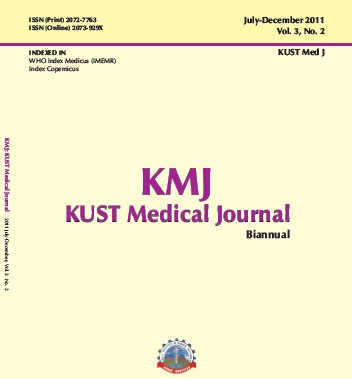Sleep Patterns and Association with Academic Performance in Students of a Medical College in Pakistan
Main Article Content
Abstract
Objectives: To determine the various sleep patterns in medical students appearing in various ongoing professional exams of Shifa Medical College and to find out relationship between number of hours of sleep before an examination with academic performance in relevant exam.
Material and Methods: This cross sectional survey was conducted at Shifa College of Medicine, Islamabad from 1-31 January, 2011. All students who had given an examination in one month period were identified through Student Affairs section of the college. Data was collected on a questionnaire and was analyzed in SPSS 17.0.
Results: Out of 195 students, 189 (96.9%) participated in study. Mean sleep of students in routine was 7.30 +1.66 hours and before exam was 4.74 + 2.57 hours. Students felt refreshed after a mean sleep of 8.99+3.31 hours. Females slept on average less than males. About 84.3% (86/102) of the passed students and 81.6% (71/89) failed students slept for < 7 hours. One hundred and twenty (63.5%) participants felt that their performance was not affected by sleep. Coffee and tea were popular student choices for staying awake before an exam. Most students (n= 184, 97.4%) did not take any medication to sleep at the night of the exam.
Conclusion: Majority of the students had reduced sleep in exam days and its reason was found to be studying late and no firm relationship was found between sleep at night before paper and academic performance. Further studies are recommended to find out any relationship between the two entities.
Key Words: Sleep Pattern, Academic Performance, Medical Students.
This article may be cited as: Kazim M, Abrar A. Sleep patterns and academic performance in students of a medical college in Pakistan. KUST Med J 2011; 3(2): 57-60.
Article Details
Work published in KMUJ is licensed under a
Creative Commons Attribution 4.0 License
Authors are permitted and encouraged to post their work online (e.g., in institutional repositories or on their website) prior to and during the submission process, as it can lead to productive exchanges, as well as earlier and greater citation of published work.
(e.g., in institutional repositories or on their website) prior to and during the submission process, as it can lead to productive exchanges, as well as earlier and greater citation of published work.
